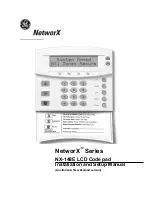
ENFORCER Split Series Keypad with Proximity Card Reader
20
SECO-LARM U.S.A., Inc.
Programming Common User Codes (continued):
NOTE:
•
represents the new common user code, which can be 4 to 8 digits long.
•
Programming a new common user code will overwrite the previous common user code.
•
A common user code is not necessary if unique user codes are assigned.
•
The master, super user, common user, visitor, duress, and user codes cannot be the
same.
Programming User Codes and Proximity Cards:
When programming user codes and/or proximity cards, use this general formula:
– Output
– Security Level (or
, to delete a user code or card)
– User ID
– User Code/Proximity Card
Outputs:
•
– Output #1, up to 1,000 possible user codes and proximity cards.
•
– Output #2, up to 100 possible user codes and proximity cards.
•
– Output #3, up to 100 possible user codes and proximity cards.
Security Levels and Card/Code Deletion:
There are four possible security levels for the SK-4131-SPSQ:
•
– Card only – The most basic, convenient level of security. Just tap a
previously-programmed proximity card over the keypad to activate outputs #1, #2, or #3.
NOTE: The duress code feature cannot be used with the keypad programmed to the "card
only" security mode. However, a duress code can be entered instead of a card.
•
– User code only – Type a 4 to 8-digit user code to activate outputs #1, #2, or #3.
•
– Card + Unique user code – The most secure level. This code is programmed
separately for each card and can be unique to the card, or the same code can be used for a
group or department. The card and code must be used together to operate the output.
•
– Card + Common user code – All valid proximity cards can be programmed with a single
common user code so that outputs #1, #2, or #3 can only be activated if one of the cards and
the common user code are used together. The common user code is automatically assigned
as each proximity card is programmed into a keypad.
•
– Delete a programmed proximity card or code.
•
– Delete all programmed proximity cards or codes for the selected output.













































